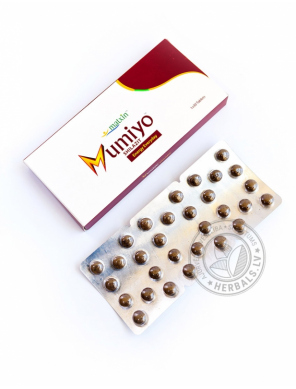Products
- Ayurvedic tea
- Indian teas
- Supplements
- Oils and drinks for health
- Facial Care
- For Skin
- Dental care
- For personal hygiene
- Sport and Yoga
- For Hair Health
- For massage
- Healthcare
- For Women
- Supplements for Men
- Aromatherapy Essential Oil
- Incense sticks
- Indian Food
- Vegan
- Superfoods
- For meditation
- For home
- New Products
- Specials
- Ayurvedic Herbs
- Wholesale
- Gifts and Kits
Browser notifications:
MUMIYO (SHILAJIT) -50%
Biological control, normalizes overall health
Sorry, product currently is not available.
Shilajit is a rare tonic “herbal” substance collected by local inhabitants in the Himalayas and as far north as Russia. It has been used for thousands of years as a tonic. Shilajit is regarded by many herbalists as the most important natural tonic substance of Ayurveda (the traditional Indian health care system). In Sanskrit, Shilajit means "conqueror of mountains and destroyer of weakness."
Shilajit is an “exudate” that oozes out of cracks in the Himalayan rocks and cliffs in the summer months. It is composed of organic plant material that is thought to have been compressed by rock for hundreds of years. After it is collected, it is naturally purified, concentrated and processed into a potent, high-quality extract.
Shilajit is extremely rich in plant-source ‘organic’ minerals. Most assays show that Shilajit, depending on its source, contains between 70 and 85 complexed minerals and trace elements. Shilajit is a humic substance, humus being the natural material that is formed when soil microorganisms decompose organic material into elements usable by plants. Shilajit is astoundingly rich in nutrients, antioxidants, amino acids, and phytochemicals.
The main active component in Shilajit, to our knowledge, are macromolecules known as fulvic acids. Shilajit is extremely rich in fulvic acids (Dragon Herbs Shilajit, from high altitude in the Himalayas, contains approximately 40% fulvic acids). Fulvic acids are one of nature’s most astounding and miraculous molecular substances, perhaps second only to DNA in its importance to life on this planet.
The Functions of Shilajit
Fulvic acid supports every stage of cellular metabolism. It is thus a quintessential Qi tonic, a substance that improves human vitality.
Fulvic acid has the ability to neutralize free radicals throughout the body and to detoxify simple toxins. This is due to its huge surface area and enormous total valence.
Shilajit is traditionally considered to be a strong kidney tonic. From a Chinese perspective, it is a superb Jing tonic, since it increases the primal energy responsible for sexual and spiritual power.
Traditional Functions
Jing tonic – Tones the sexual organs, supports sexual energy and stamina (traditionally considered to be an “aphrodisiac”), supports healthy prostate function Qi tonic - Enhances energy and stamina.
Shen tonic - Enhances spiritual power
Enhances bioavailability and action of other herbs
Detoxifying – huge high-valence surface area collects debris and free radicals, cleansing the blood and tissues of the body
A carrier – binds to herbal constituents and minerals, delivering them to their targets
A catalyst – promotes the activity of minerals and organic constituents
Supports urinary functions Supports healthy microcirculation
Supports healthy menstrual functions
Supports the immune system
Supports healthy fat metabolism
Supports lung functions
Used for general fortification and tonification of the entire body.
Ingredients: 1 tablet contains Shilajit (Asphaltum purificata) 250 mg.
How to use: 1 tablet 2 times a day, during a meal with milk or water.
It is advisable not to exceed the specified daily dose.
This product is not a substitute for a complete and balanced diet
Manufacturer: Matxin, India
Net weight: 30 tablets
Shilajit is an “exudate” that oozes out of cracks in the Himalayan rocks and cliffs in the summer months. It is composed of organic plant material that is thought to have been compressed by rock for hundreds of years. After it is collected, it is naturally purified, concentrated and processed into a potent, high-quality extract.
Shilajit is extremely rich in plant-source ‘organic’ minerals. Most assays show that Shilajit, depending on its source, contains between 70 and 85 complexed minerals and trace elements. Shilajit is a humic substance, humus being the natural material that is formed when soil microorganisms decompose organic material into elements usable by plants. Shilajit is astoundingly rich in nutrients, antioxidants, amino acids, and phytochemicals.
The main active component in Shilajit, to our knowledge, are macromolecules known as fulvic acids. Shilajit is extremely rich in fulvic acids (Dragon Herbs Shilajit, from high altitude in the Himalayas, contains approximately 40% fulvic acids). Fulvic acids are one of nature’s most astounding and miraculous molecular substances, perhaps second only to DNA in its importance to life on this planet.
The Functions of Shilajit
Fulvic acid supports every stage of cellular metabolism. It is thus a quintessential Qi tonic, a substance that improves human vitality.
Fulvic acid has the ability to neutralize free radicals throughout the body and to detoxify simple toxins. This is due to its huge surface area and enormous total valence.
Shilajit is traditionally considered to be a strong kidney tonic. From a Chinese perspective, it is a superb Jing tonic, since it increases the primal energy responsible for sexual and spiritual power.
Traditional Functions
Jing tonic – Tones the sexual organs, supports sexual energy and stamina (traditionally considered to be an “aphrodisiac”), supports healthy prostate function Qi tonic - Enhances energy and stamina.
Shen tonic - Enhances spiritual power
Enhances bioavailability and action of other herbs
Detoxifying – huge high-valence surface area collects debris and free radicals, cleansing the blood and tissues of the body
A carrier – binds to herbal constituents and minerals, delivering them to their targets
A catalyst – promotes the activity of minerals and organic constituents
Supports urinary functions Supports healthy microcirculation
Supports healthy menstrual functions
Supports the immune system
Supports healthy fat metabolism
Supports lung functions
Used for general fortification and tonification of the entire body.
Ingredients: 1 tablet contains Shilajit (Asphaltum purificata) 250 mg.
How to use: 1 tablet 2 times a day, during a meal with milk or water.
It is advisable not to exceed the specified daily dose.
This product is not a substitute for a complete and balanced diet
Manufacturer: Matxin, India
Net weight: 30 tablets
Also bought
 CHYAWANPRASH Dabur 1kg
19.00€
Chyawanprash stimulates balanced work of all systems in the human body
CHYAWANPRASH Dabur 1kg
19.00€
Chyawanprash stimulates balanced work of all systems in the human body
 SPIRULINA ORGANIC Herbals 300 tablets
9.50€
Blue-green algae Spirulina tablets
SPIRULINA ORGANIC Herbals 300 tablets
9.50€
Blue-green algae Spirulina tablets
 SUPERFOODS GOJI BERRY
10.50€
Goji berries
SUPERFOODS GOJI BERRY
10.50€
Goji berries
Top sellers
 SPIRULINA ORGANIC Herbals 300 tablets
9.50€
Blue-green algae Spirulina tablets
SPIRULINA ORGANIC Herbals 300 tablets
9.50€
Blue-green algae Spirulina tablets
 MERIT pills
6.50€
Indonesian formula for the reduction and control of body weight
MERIT pills
6.50€
Indonesian formula for the reduction and control of body weight
 BIO TRIPHALA ORGANIC
7.50€
Triphala improves metabolism and has a cleansing and detoxifying effect
BIO TRIPHALA ORGANIC
7.50€
Triphala improves metabolism and has a cleansing and detoxifying effect
This item has been added to cart.










